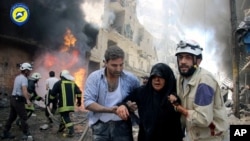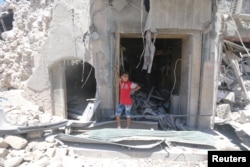The United Nations has called for an urgent cease-fire Tuesday in the Syrian city of Aleppo where infrastructure is crumbling in the face of violence.
Up to two million residents have been left without running water or electricity, the U.N. said Tuesday. As Syrian rebels continue to fight to break the Assad government’s siege on Aleppo, medical workers told U.N. diplomats Monday of the hell Syria’s largest city has become.
“The children in Aleppo have no baby milk; the doctors have severe shortages of medicines, blood, sutures and ventilators; and people have no bread, meat or cooking gas,” Dr. Zaher Shaloul of the Chicago-based Syrian American Medical Society (SAMS) told members of the Security Council.
Dr. Samer Attar, who also works with SAMS, showed council members pictures of children with amputated legs and brain injuries. He said Aleppo’s hospitals look more like bunkers, surrounded by sandbags and barrels to offer some protection against near daily bombings. He said at one hospital where he worked, patients were treated in the basement because the upper floor was too susceptible to attack.
“You live your life here one massacre, one slaughter at a time,” Attar said. He scolded the council for its lack of action and urged it to do more. “This body does have the power to make all of this stop. This body has the power to save lives and limbs on a scale that doctors cannot,” he said.
A representative of the Syrian White Helmets civil defense force participated via a prerecorded video, during which a constant barrage of shelling and gunfire played in the background. Khaled Harah spoke of the 250 people who had died in the past month in Aleppo, and the targeting of White Helmets as they have tried to save the injured. He said the international silence about the siege of Aleppo was “shameful.”
“There are some areas in Aleppo that look like an apocalyptic wasteland,” Attar said.
Shaloul told council members that their resolution authorizing cross-border humanitarian aid had helped. “It is one of the reasons that Aleppo is still alive,” he said.
Shaloul, however, warned that a Russian initiative for humanitarian corridors to evacuate people, which has helped 400 civilians and 90 rebels leave the city, would be more difficult to sustain.
"How can you trust a government that is bombing your children and your hospitals?" he asked.
Also Monday, U.N. humanitarian officials called for a pause in fighting in Aleppo in order to allow for repairs to the city's water and electricity networks that have been severely damaged by violence during the past week.
A statement from Yacoub El Hillo, U.N. resident coordinator for Syria, and Kevin Kennedy, regional humanitarian coordinator for the Syria crisis, said more than two million people in Aleppo were without power or public water access.
"Water available through wells and tanks in Aleppo is not nearly enough to sustain the needs of the population," they said. "The U.N. is extremely concerned that the consequences will be dire for millions of civilians if the electricity and water networks are not immediately repaired."
U.S. Ambassador to the U.N. Samantha Power reiterated concerns about the toll of the conflict, saying that even with "the overwhelming force" of pro-government fighters it is clear there will be no quick military win for either side in Aleppo.
"Yet the longer the fighting drags on, the more civilians will be caught in the middle, the more that they will pay the highest price," she said.





